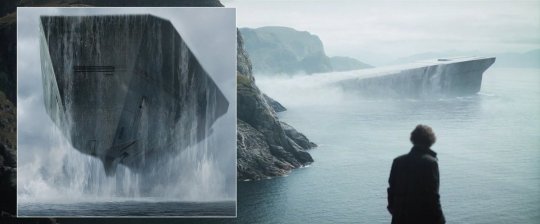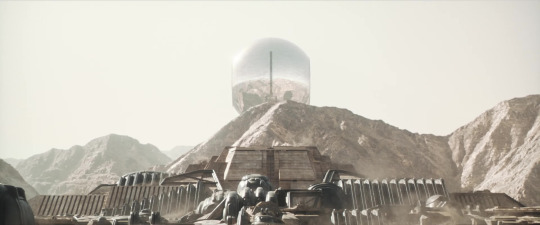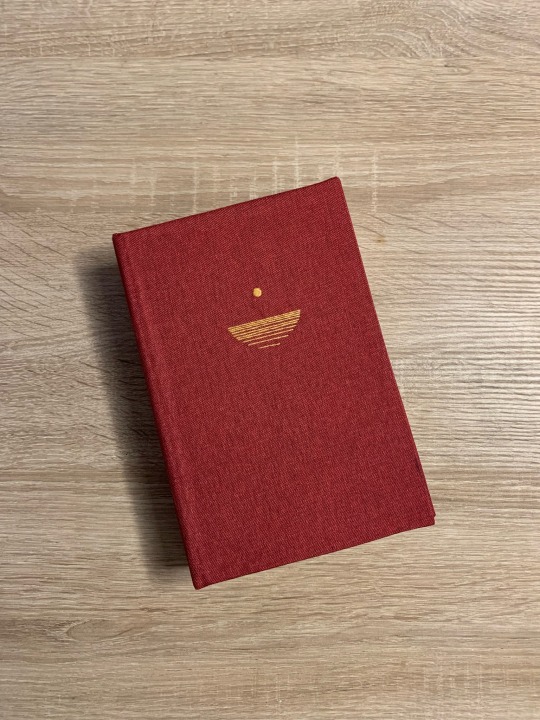Text
Let Paul and Chani fight each other in Dune Messiah. Let Paul start by trying to convince Chani to join him and then get angry when she refuses. Let them forget the memories of their love for just one moment, long enough to hurt each other.
41 notes
·
View notes
Text
Still having Chani feelings, man. Because I think it is actually not that common to see a character (but especially a female character) whose main commitment in life is to a political struggle, and to have that be taken seriously by the narrative. Not painted as naive idealism or a trendy lifestyle choice or something the character eventually leaves behind for "real" commitments like marriage, career or children.
We don't see really anything of Chani's home life in the sietch, but it seems reasonable to infer that the fedaykin are what she's built her life around. The very first thing we learn about her, before we even know her name, is that she's a fighter. This is a core part of her identity.
She falls in love with Paul when he's willing to risk his life beside her as an equal, for a cause that she can't escape but he could walk away from if he chose. The question she asks him is not Do you love me? but Will you always be with me? Will you always be beside me in the struggle, fighting for the same things I am?
And as soon as the answer to that question is no, they're over. There is absolutely no possibility of love overriding that political betrayal, because her love for him is inextricable from coming to trust that he is committed to their liberation and not simply trying to use them. He said over and over again that he didn't want power, and as soon as he reaches out to claim it there is no way they can be together. The worst betrayal isn't watching him choose another woman, it's watching him declare himself emperor and send her own people off to slaughter others when he said he was fighting for their freedom.
So she leaves him, and we're never supposed to see it as anything but justified. There is simply no way she will turn her back on the most important thing in her life for him.
440 notes
·
View notes
Text
I'm all for "trusting the audience" and "being subtle with the themes" until the bitches start misunderstanding the main idea of the story
6 notes
·
View notes
Text
Correct me if I'm wrong, but Paul's predictions didn't always come true even after he drank the water of life. If I am wrong about it, there's still no way to know for sure if he really saw all of the possible timelines and also interpreted them correctly. The idea of a destiny in Dune books is implied to be a self-imposed thing - Bene Gesserit, for example, quite literally forced their version of the future to come true.
The problem here is that no one thought "hey, maybe this one guy's prescience is not enough to justify all those deaths." But Paul's authority at that point was unquestionable.
I don't know if the future he saw actually happened in later books but I would argue it doesn't matter. Who knows, maybe if Paul never drank the water of life, they could've avoided the whole situation.
It's interesting that all of this is more relevant today than it was in Herbert's times. Someone may soon create an AI that predicts the course of our development. And a certain group of people would see its predictions as absolute - after all, a machine cannot be biased, right? Well, what happens if the AI tells you that if you do a morally wrong thing today (not nessesarily kill people outright) then in ten thousand years humanity wouldn’t go extinct?
And what happens if "the one percent" decides to go with it?
the funny thing about Dune is that Frank Herbert kind of gave up on the "oooh don't follow the hero" thing pretty quick because it turns out if you don't follow the hero all of humanity gets killed by robots in ten thousand years.
22 notes
·
View notes
Text






One of the things I most love about the aesthetics of the Villeneuve Dune movies is how the spaceships are, almost completely without apology, a brick.
These are spaceships that instantly and brutally communicate that they are of such high technology that they have no need to pay lip service to "aerodynamics" or "weather." They even eliminate the 'traditional' hallmarks of spaceships - no rockets, no nose cones, barely even a slit of a window to serve as a bridge. They're huge self-propelled cargo containers; huge rectangles and ovals onto which someone stuck a few utility blisters. The Emperor arrives to the last quarter of the story riding in a gigantic mirror-polished marble, a ridiculous display of ostentatious design somehow married to an almost comically simple shape.
I love Star Trek and Star Wars and Warhammer 40k, but it's so refreshing to see a sci-fi story disregard such standbys as "World War 2 in space" or "overtly designed ships-as-art" in favor of the most blunt force trauma possible. An array of ships that instantly communicates how This Empire Hates You by virtue of near-complete lack of the human touch.
46 notes
·
View notes
Text
I hope if Denis Villeneuve doesn't give Paul and Chani reconciliation in the next movie, book fans are not going to come for him.
Movie Chani deserves to be her own character at this point. There's so many opportunities in exploring a different path for both of them instead of trying to bring them together just for the sake of being faithful to the book. Not saying that it's impossible, but it's not required to make the story work on its own.
8 notes
·
View notes
Text
I love Dune movies because they allow me to engage in deep social, political and ethical discussions while I watch space wizards fight over space cocaine
23 notes
·
View notes
Text


I did a faux rebind of Dune as a birthday gift for a friend of mine. Thankfully, his girlfriend sent me pictures of his own Dune Edition (in German) and its measurements. That way he can use this book sleeve for the German edition too. He’s been complaining about that design for quite a while, basically every time we enter a book store.
I also hand-stitched this little desert design into the book cloth, because I don’t own a cricut lol
And here is how it works:
Here’s the tutorial by bindrebindery on ig
And here's the tutorial for all the tiktok kids
She's been a huge help throughout my adventures in rebinding books, and straight up just deserves more recognition.
328 notes
·
View notes
Text
"I would never be radicalised by a charismatic leader," I say as I rewind my cam quality pirated copy of Dune Part 2 and rewatch the Fremen War Council scene for the 50th time
93 notes
·
View notes
Text
There are so many places in the Villeneuve Dune adaptations where he just...takes all the narrative pieces that Frank Herbert laid out and subtly rearranges them into something that tells the story better--that creates dramatic tension where you need it, communicates the themes and message of the book more clearly, or corrects something in the text that contradicts or undermines what Herbert said he was trying to say.
The fedaykin are probably my favorite example of this. I just re-read a little part of the book and got smacked in the face with how different they are.
(under the cut for book spoilers and length)
The fedaykin in the book are Paul's personal followers, sort of his personal guard. They show up after his legend has already started growing (the word doesn't appear in the book until chapter 40) and they are people who have specifically dedicated themselves to fighting for him, and right from the moment they're introduced there is a kind of implied fanaticism to their militancy that's a bit uncomfortable to read. They're the most ardent believers in Paul's messianic status and willing to die for him. (They are also, as far as you can tell from the text, all men.)
In the book, as far as I can remember (I could be forgetting some small detail but I don't think so) there is no mention of armed resistance to colonialism on Arrakis before Paul shows up. As far as we know, he created it. This is exacerbated by the two-year time jump in the book, which means we never see how Paul goes from being a newly deposed ex-colonial overlord running for his life to someone who has his own private militia of people ready to give their lives for him.
The movie completely flips all these dynamics on their head in ways that add up to a radical change in meaning.
The fedaykin in the movie are an already-existing guerrilla resistance movement on Arrakis that formed long before Paul showed up. Literally the first thing we learn about the Fremen, less that two minutes into the first movie, is that they are fighting back against the colonization and exploitation of their home and have been for decades.
The movie fedaykin also start out being the most skeptical of the prophecy about Paul, which is a great choice from both a political and a character standpoint. Of course they're skeptical. If you're part of a small guerrilla force repeatedly going up against a much bigger and stronger imperial army...you have to believe in your own agency. You have to believe that it is possible to win, and that this tiny little chip in the armor of a giant terrifying military machine that you are making right now will make a difference in the end. These are the people who are directly on the front lines of resisting oppression. They are doing it with their own sweat, blood and ingenuity, and they are not about to wait around for some messiah who may never come.
From a character standpoint, this is really the best possible environment you could put Paul Atreides in if you want to keep him humble. He doesn't get any automatic respect handed to him due to title or birthright or religious belief. He has to prove himself--not as any kind of savior but as a good fighter and a reliable member of a collective political project. And he does. This is an environment that really draws out his best qualities. He's a skilled fighter; he's brave (sometimes recklessly so); he's intensely loyal to and protective of people he cares about. He is not too proud to learn from others and work hard in an egalitarian environment where he gets no special treatment or extra glory. The longer he spends with the fedaykin the more his allegiance shifts from Atreides to Fremen, and the more skeptical he himself becomes about the prophecy. This sets up the conflict with Jessica, which comes to a head before she leaves for the south. And his political sincerity--that he genuinely comes to believe that these people deserve liberation from all colonial forces and his only role should be to help where he can--is what makes the tragedy work. Because in the end we know he will betray all these values and become the exact thing he said he didn't want to be.
There's another layer of meaning to all this that I don't know if the filmmakers were even aware of. Given the time period (1960s) and Herbert's propensity for using Arabic or Arabic-inspired words for aspects of Fremen culture, it seems very likely that the made-up word fedaykin was taken from fedayeen, a real Arabic word that was frequently used untranslated in American news media at the time, usually to refer to Palestinian armed resistance groups.
Fedayeen is usually translated into English as fighter, guerrilla, militant or something similar. The translation of fedaykin that Herbert provides in Dune is "death commando"...which is a whole bucket of yikes in my opinion, but it's not entirely absurd if we're assuming that this fake word and the real word fedayeen function in the same way. A more literal translation of fedayeen is "self-sacrificer," as in willing, intentional self-sacrifice for a political cause, up to and including sacrificing your life.
If you apply this logic to Dune, it means that Villeneuve has actually shifted the meaning of this word in-universe, from fighters who are willing to sacrifice themselves for Paul to fighters who are willing to sacrifice themselves for their people. And the fedaykin are no longer a group created for Paul but a group that Paul counts himself as part of, one member among equals. Which is just WILDLY different from what's in the book. And so much better in my opinion.
1K notes
·
View notes
Text
I know people like to interpret Paul as an outright villain of the story and while that's not unreasonable, I personally love another interpretation.
It doesn't matter if you are a kind person with good intentions, it doesn't matter if you are smarter that anyone else and it doesn't matter if you can literally see the future, NO ONE has the right to hold absolute power over other people.
Systems with strict vertical hierarchy cause oppression. There is no way around it. Even that one guy who you think is better than that shouldn't be put at the top.
Paul being portrayed with many positive character traits doesn't muddy the message, it enhances it.
2K notes
·
View notes
Text
*puts injured Paul in the bath of black goo as a parallel to the Baron* this bad boy can fit so much dramatic irony
22 notes
·
View notes
Text
Spoilers for Dune Messiah
The idea of Paul relying on his visions after losing eyesight. He knows that some of the things he sees are not real, they come from other timelines and haunt him like ghosts. He sees Chani beside him every time he wakes up even though they live in different worlds.
She still despises his decisions, still tries to prove him wrong, and he begins to listen after a while, because there is no one else to listen to.
Better futures blend into his reality and he is not sure if they are possible or if its just his wishful thinking. Is there even a difference? Can he see the futures that he would never be a part of? And if not, then how can he be so sure that the path he's walking on really is the Golden Path?
Years later, visions stop. He is left alone in the darkness, but remembers every word that she didn't tell him.
14 notes
·
View notes
Text
I haven't read Dune Messiah but all I want from the third movie is for Paul and Chani to fuck each other up in a knife fight. I think it would be cool and sexy of them
35 notes
·
View notes